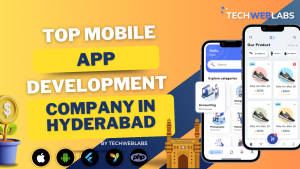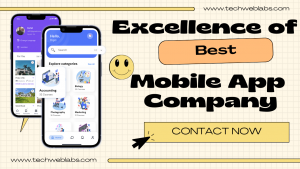Unlocking Business Potential with Expert Mobile App Development
Introduction to Mobile App Development
In today’s digital landscape, mobile app development has become an integral part of businesses’ growth strategies. As smartphones have become ubiquitous, mobile apps offer a powerful way to connect with customers and enhance their experience. This article will delve into the world of mobile app development, exploring its significance and the benefits it brings to businesses.
Importance and Benefits of Mobile Apps
Mobile apps play a vital role in the success of businesses across various industries. They provide a direct channel of communication between businesses and their customers, leading to improved customer engagement and satisfaction. With mobile apps, businesses can offer personalized experiences, deliver targeted promotions, and gather valuable data for analysis. Furthermore, mobile apps increase brand visibility, help establish a competitive edge, and unlock new revenue opportunities.
Key Steps in Mobile App Development Process
Developing a mobile app involves a comprehensive process that requires careful planning and execution. The key steps include:
- Conceptualization: Defining the app’s purpose, target audience, and core features. Conducting market research to identify user needs and preferences.
- Planning: Creating a detailed project plan, setting milestones, and allocating resources. Determining the app’s technical requirements and developing a timeline.
- Design: Focusing on user-centric design principles to create an intuitive and visually appealing interface. Designing wireframes and prototypes to test the app’s usability.
- Development: Building the app using programming languages such as Java, Swift, or React Native. Leveraging integrated development environments (IDEs) and libraries to streamline the development process.
- Testing: Conducting thorough testing to ensure the app’s functionality, performance, and security. Implementing both manual and automated testing techniques to identify and fix any bugs or issues.
- Deployment: Preparing the app for release by optimizing its performance and compatibility across different devices and operating systems. Submitting the app to the respective app stores for approval.
Choosing the Right Platform for Your App
Selecting the appropriate platform for your mobile app is crucial to reach your target audience effectively. Considerations such as target market, budget, and desired features will influence your decision. iOS and Android are the dominant platforms, each with its advantages and user base. Alternatively, cross-platform development frameworks like React Native and Flutter offer the ability to build apps that work on multiple platforms simultaneously.
Design and User Experience Considerations
A well-designed mobile app with a seamless user experience is essential for user satisfaction and retention. User-centric design focuses on understanding user behavior and preferences, ensuring that the app’s interface is intuitive, visually appealing, and easy to navigate. Incorporating features like clear navigation, minimalistic design, and interactive elements enhances the user experience and encourages engagement.
Development Tools and Technologies
The field of mobile app development offers a wide range of tools, frameworks, and technologies that facilitate the development process. Popular programming languages like Java, Kotlin, and Swift are widely used for native app development, while frameworks like React Native and Flutter enable cross-platform development. Integrated development environments (IDEs) such as Android Studio and Xcode provide comprehensive tools for coding, debugging, and testing mobile apps.
Testing and Quality Assurance
To ensure the functionality, performance, and security of mobile apps, rigorous testing and quality assurance processes are essential. Testing should cover various aspects, including functionality, performance, usability, compatibility, and security. Adopting both manual and automated testing approaches helps identify and rectify issues, ensuring a seamless user experience and minimizing the risk of crashes or vulnerabilities.
App Store Optimization (ASO) and App Marketing
App Store Optimization (ASO) is the process of optimizing mobile apps to improve their visibility in app stores and increase downloads. This includes optimizing keywords, writing compelling app descriptions, and acquiring positive user reviews. App marketing strategies such as social media campaigns, influencer collaborations, and targeted advertising help generate awareness, drive app downloads, and attract a wider user base.
Emerging Trends in Mobile App Development
The mobile app development industry is continually evolving, with new trends and innovations shaping its future. Technologies like augmented reality (AR), artificial intelligence (AI), machine learning, and Internet of Things (IoT) are revolutionizing app experiences. AR allows users to interact with virtual elements in the real world, while AI enables personalized recommendations and intelligent automation. IoT integration extends app functionality to connect with smart devices and enhance user convenience.
Challenges and Pitfalls to Avoid in App Development
While mobile app development offers immense potential, it comes with challenges that need to be navigated. Common challenges include budget constraints, technical compatibility issues, security vulnerabilities, and scalability concerns. Proper planning, effective project management, and leveraging the expertise of experienced professionals help mitigate these challenges and ensure successful app development.
What Key Questions do Readers have that Need to be Answered? (FAQs)
- What is mobile app development, and why is it important?
- Mobile app development refers to the process of creating software applications specifically designed to run on mobile devices. It is important because mobile apps enable businesses to connect with customers, enhance brand visibility, and drive revenue growth.
- What are the benefits of having a mobile app for my business?
- Having a mobile app can benefit your business in multiple ways. It improves customer engagement, provides a direct communication channel, increases brand visibility, enables personalized experiences, and opens up new revenue opportunities.
- What are the key steps involved in the mobile app development process?
- The key steps in mobile app development include conceptualization, planning, design, development, testing, and deployment. Each step is crucial and contributes to the successful creation of a mobile app.
- How do I choose the right platform (iOS, Android, or cross-platform) for my app?
- The choice of platform depends on factors such as target audience, budget, and desired features. iOS and Android are the main platforms, but cross-platform frameworks like React Native and Flutter offer the advantage of building apps that work on multiple platforms simultaneously.
- What considerations should I keep in mind for app design and user experience?
- App design and user experience should prioritize user-centric principles. Consider factors like intuitive navigation, visual appeal, ease of use, and interactive elements to create a seamless and enjoyable user experience.
- Which tools and technologies are commonly used in mobile app development?
- Mobile app development relies on various tools, frameworks, and technologies. Programming languages like Java, Kotlin, Swift, and JavaScript are commonly used, along with frameworks like React Native and Flutter. Integrated development environments (IDEs) such as Android Studio and Xcode facilitate the development process.
- How can I ensure the quality and reliability of my mobile app?
- Quality assurance and testing play a vital role in ensuring the functionality, performance, and security of a mobile app. Employing rigorous testing methods, including both manual and automated approaches, helps identify and resolve any issues.
- What strategies can I use for app store optimization and effective app marketing?
- App store optimization (ASO) involves optimizing keywords, descriptions, and reviews to increase app visibility and downloads. App marketing strategies include social media promotion, influencer collaborations, targeted advertising, and engaging with your app’s user community.
- What are the latest trends and innovations in mobile app development?
- The mobile app development industry is witnessing trends like augmented reality (AR), artificial intelligence (AI), machine learning, and Internet of Things (IoT). These technologies enhance app experiences and offer new possibilities for businesses.
- What are the common challenges and pitfalls to avoid during app development?
- Challenges in app development include budget constraints, technical compatibility issues, security vulnerabilities, and scalability concerns. Proper planning, effective project management, and seeking professional expertise help overcome these challenges and ensure successful app development.
Conclusion
In today’s digital landscape, mobile app development plays a crucial role in connecting businesses with their target audience and driving growth. From enhancing customer engagement to boosting brand visibility and increasing revenue opportunities, mobile apps offer numerous benefits. Understanding the key steps in the app development process, selecting the right platform, prioritizing design and user experience, utilizing the right tools and technologies, and implementing robust testing and marketing strategies are all essential for successful app development.
At TechWebLabs, we specialize in mobile app development, helping businesses bring their app ideas to life. Our team of experienced professionals understands the intricacies of the app development process and stays up-to-date with the latest trends and technologies. With a focus on user-centric design, we create intuitive and visually appealing mobile apps that deliver exceptional user experiences.
With our expertise in app store optimization (ASO) and app marketing, we ensure maximum app visibility and drive user acquisition. We help businesses navigate the challenges and pitfalls of app development, ensuring quality and reliability throughout the process. Whether you’re looking to develop a native app for iOS or Android or a cross-platform solution, TechWebLabs has the expertise to meet your specific requirements.
Choose TechWebLabs for your mobile app development needs and unlock the full potential of your business in the digital world.


